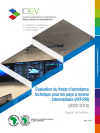Independent Development Evaluation (IDEV) at the African Development Bank (AfDB) has conducted an evaluation of the Bank’s Country Strategy and Program (CSP) in Eswatini for 2009-2018. The evaluation covered a Bank portfolio of 14 projects representing a total of UA 119 million in seven sectors: (i) agriculture; (ii) water supply and sanitation; (iii) transport; (iv) finance; (v) power/energy; (vi) environment; and (vii) multi-sector (governance).

The transition to Green Growth is one of the two overarching objectives of the African Development Bank’s (AfDB or the Bank) Ten Year Strategy 2013-2022. In order to improve the performance of the Bank in terms of mainstreaming Green Growth and climate change considerations into its strategies and operations, the Independent Development Evaluation (IDEV) is conducting an evaluation of the Bank’s interventions in this area between 2008 and 2018.
The evaluation of the energy governance cluster Program Based Operations (PBOs) is one of seven components of a broader evaluation on the use of PBOs by the AfDB in 2012-2017. This evaluation examines eight PBOs focused on energy, which the AfDB approved and implemented in five countries (Angola, Burkina Faso, Comoros, Nigeria and Tanzania). The objective of this cluster evaluation is to assess the relevance, effectiveness, efficiency and sustainability of the eight PBOs, synthesize the results and draw relevant lessons for the future design and management of PBOs by the Bank.
The objective of the Private Sector Environment (PSE) Cluster Evaluation was to assess the relevance, effectiveness, efficiency and sustainability of the Programme Based Operations (PBOs) of the AfDB that focused on the PSE. The AfDB conducted these PBOs in five countries (Egypt, Ghana, Mali, Morocco and Seychelles) between 2012 and 2017. This report synthesizes the key findings of the evaluation and draws relevant lessons for the future design and management of PBOs by the AfDB.

The African Development Bank (AfDB) Regional Member Countries are categorized as low, middle, and high-income based on their per capita Gross National Income. Despite their relatively high per capita income level, most middle-income countries (MICs) in Africa remain vulnerable to external shocks from the global commodity and financial markets. Furthermore, they face unique development challenges such as rising income inequality and pockets of poverty, high youth unemployment and persistent infrastructure deficits.
Independent Development Evaluation (IDEV) has conducted an evaluation of the Country Strategy and Program (CSP) of the African Development Bank (AfDB) for the Republic of Mauritius over a ten year period (2009 - 2018). During this period, which encompasses two strategic cycles (CSP 2009–2013 and CSP 2014–2018) the funds committed by the AfDB to Mauritius amounted to approximately USD 854 million (this excludes equity funds and some trust funds).